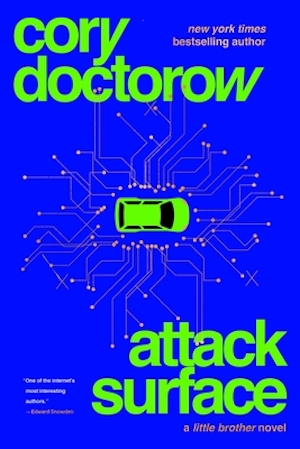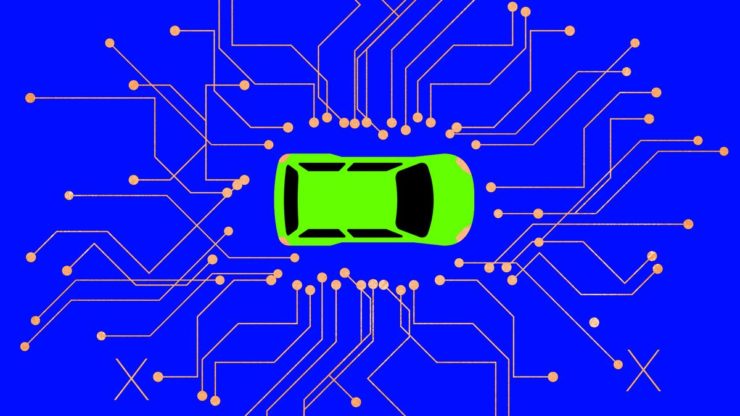People with established careers are terrible sources of advice on how to break into their chosen field. When I was a baby writer, I attended numerous panels about getting established, where writers a generation or two older than me explained how to charm John W Campbell into buying a story for Astounding Stories. This was not useful advice. Not only had Campbell died six days before I was born, but he was also a fascist.
I have two careers, one in tech and the other in SF, a peanut-butter-and-chocolate combo that’s got a long history in the field, and I am often asked how to break into both fields. I know an awful lot about how to sell a story to Gardner Dozois, who stopped editing Asimov’s sixteen years ago and died two years ago, but I know nothing about pitching contemporary SF editors.
Likewise: I know an awful lot about breaking into the tech industry circa 1990: first, be born in 1971. Next, be raised in a house with a succession of primitive computers and modems. Enter the field in the midst of a massive investment bubble that creates jobs faster than they can be filled, when credentials are irrelevant.
Another advantage we had in the 1990s tech industry: cyberpunk. Cyberpunk, a literary genre that ruled sf for about two decades, was primarily written by people who knew very little about the inner workings of computers, and who were often barely able to use them.
But these same writers were, as William Gibson put it, “attuned to the poetics of technological subculture” (Gibson’s degree is in comparative literature, after all). They wrote about how it felt to have mastery of technology, and what the ethical, social and personal connotations of that mastery were. In that regard, they were squarely in the tradition of the strain of sf that starts with Frankenstein and the technologist’s inner life of hubris, self-doubt, triumph and regret.
Buy the Book


Attack Surface
But the cyberpunks departed from that strain in their lionization of technologists: they made tinkering with computers rock-star cool, gangster cool, revolutionary leader cool. Untethered from the tedious business of having to deal with computers as they were, or even as they could be (given theoretical limits on computing), the cyberpunks were able to fuse the technologist archetype with the wizard archetype, creating protagonists who could use networks to project their will over billions of people without seeking permission or even facing real consequences.
This made for heady reading for young would-be technologists at that moment when, without permission, we were entering a field that had been reinvented as an uncredentialed wild west, where you could just write and release code, and, if others ran it, it would change the world. This was the era when a British physicist at a Swiss supercollider cobbled together a hypertext system in his spare time, released his rough-and-ready design into the wild, and announced that it was called “the World Wide Web.”
It wasn’t just technologists who were captivated by the cyberpunks’ myth-making: it was their employers. Companies didn’t understand what technology did, but they understood that it was doing something and that their companies needed to do that something, whatever it was. They hired us.
We learned on the job. Charlie Stross switched from his job as a pharmacist and became a computer programmer. He wasn’t the only one. Science fiction has always attracted people with a technical bent, from Clarke’s orbital mechanics to Capek’s robots, and science fiction fandom was the first nontechnical online community, giving fans a reason to get online long before anyone else wanted to. The world of SF fandom—from which most SF writers are drawn—was online early, and intensely, and thus when opportunities knocked for high-paid tech jobs, SF fandom (including writers) answered.
Cyberpunk writers—though not overly technical—inspired a generation of writers (Neal Stephenson, Charlie Stross, Annalee Newitz, etc) who were very technical, and these writers went on to both create a cyberpunk practice of technology—liberationist, politicized, subcultural, criminal—and also to write fiction.
This “post-cyberpunk” fiction is just as attuned to the “poetics of technological subculture,” but with a significant difference: computers in post-cyberpunk fiction, are, by and large, not metaphors. Rather than imagining futuristic computers whose capabilities and limitations are defined by the plot, post-cyberpunk writers imagine futuristic plots whose contours are defined by the capabilities and limitations of computers from Cryptonomicon to my own Little Brother.
This is somewhat by necessity: cyberpunk’s metaphorical—and sometimes fantastical—computers (think of the AIs in Neuromancer) were easier to sell to an audience that had less direct experience with computers overall (in the same way that an audience of suburban Americans far removed from the frontier life might overlook the fact that a cowboy’s six-gun fired ten rounds before reloading).
But post-cyberpunk writers are obsessed with the technical reality of computers for other reasons. After all, so many of us work in the tech industry and are both constrained and informed by technical reality in our working and artistic lives.
But most of all, post-cyberpunk cares about the technical nitty gritty because of its relationship to the poetics of tech subculture and the hacker archetypes of cyberpunk. For your characters to have rock-star (Hiro Protagonist), gangster (Manfred Macx) or revolutionary leader (Marcus Yallow) cool, for them to embody the fusion of the technologist archetype with the wizard archetype, they have to know a lot about the underlying technical reality. They have to know its strengths and its weaknesses, and, most of all, where a lever can be used to make it lurch dramatically into a new configuration.
Today’s tech industry is much more ossified than it was in the cyberpunk era: it has formal degree programs, certification systems, and training services without limit. But writers needn’t get a technical degree to attain technical literacy: now more than ever, online communities exist to solve every kind of technical challenge and answer every kind of technical question. From communities like Quora to the Massively Online Open Courses at MIT, Stanford and the Open University (where I’m a visiting professor), there has never been a better time to attain technical mastery.
Cory Doctorow is a science fiction author, activist and journalist. He is the author of many books, most recently Radicalized and Walkaway, science fiction for adults; In Real Life, a graphic novel; Information Doesn’t Want To Be Free, a book about earning a living in the Internet age; and Homeland, a YA sequel to Little Brother. His latest book is Poesy the Monster Slayer, a picture book for young readers. His next book is Attack Surface, an adult sequel to Little Brother.










